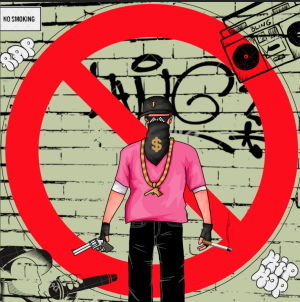Advice from a formerly stressed-out senior: An in-depth guide to dealing with stress
Dylan Mai, pictured here with senior English/AVID teacher Ms. Nguyen, is an expert in balancing schoolwork and managing stress.
May 29, 2020
It’s Sunday night. Your head hits the pillow and you try to drift off to sleep. Usually, it only takes you about 20 minutes to knock out, but this time, you’re wide awake. Your brain refuses to calm down. You think about the big math test that Kaneko’s giving on Friday, which is also the same day that Ramos’ reading notes are due. You’ve also got to work on something for dance practice on Wednesday and have an essay due on Thursday morning. So much to do and so little time to do it.
In the midst of struggling to figure out how to get all of this, you constantly think of the future because it terrifies you. The SAT has been bothering you for months; your entire future could depend on a crucial four hours in a classroom somewhere. And on top of that, the prospect of college apps and going away from home scares you.
Society puts tremendous expectations on our generation’s shoulders. The level of achievement that we have to rise to, as well as the hoops we have to jump through just to make a living, is unprecedented. So it comes as no surprise that it sometimes feels as though no matter how hard you work, it will never be enough. You put in so much work to clear a hurdle just to have two higher ones pop up before you. As a result, students these days have to deal with copious amounts of stress and anxiety.
Too much stress is dangerous. If we can’t keep it under control, it will start to consume us and eat away at our mental state. If we’re not careful, stress can turn into anxiety and even depression, which are much harder to climb out of. Fortunately, there are ways to deal with stress before it gets to us. There are many individual things that can be done together, but they can all be condensed into three “P” words: Prioritize, Plan, and don’t Panic.
The first step is to “Prioritize.” In other words, put the most important things first. In terms of school and classes, it is a good idea to focus more on classes where you struggle. For example, if you have a C in Kaneko’s class but an A in Ramos’ class, you should devote more of your time to doing Kaneko’s homework and studying for his tests. You can probably afford to skip some of Ramos’ assignments and still be in relatively good shape. Perhaps you could skip dance practice to work on that essay for English, or if you’re really passionate about dance, put that over English. Avoid “black holes”: classes or activities that yield no success regardless of your best efforts. You may consider dropping these altogether if it means you’ll have more energy for more promising endeavours.
Ultimately, it all comes down to your personal passions and goals. Don’t let anyone dictate what is good for you. Prioritize the things that truly matter to you. If art is your passion, go for it. If maintaining your mental health is more compelling than taking some fringe elective for your college app, focus on you. Letting your true priorities guide you will make you much more passionate and driven as well as alleviate the stress of not knowing what to do.
Now that you know your priorities, the second step is to “Plan” your attack. Make a mental to-do list for each day. Let’s say that you have eight sections of notes for Ramos and six chapters to study for your math test. Your essay has to be four paragraphs long including a conclusion. By simple math, this equates to two sections of history, two chapters of math, and one paragraph per day until all of these are due. You have one free period each day.
Taking all of this into consideration, you can make your list. Just as an example, you do two sections of notes each day during your free periods. When you get home, you write one paragraph of your essay, then spend the rest of the night reviewing two chapters for your math test. On Wednesday, you can tackle both a body paragraph and the conclusion. On Thursday, you do a general review of every chapter before the math test. Suddenly, that huge workload doesn’t seem so bad. As long as you stay focused and stick with your plan, you could get everything done in a timely manner.
Make sure to remember your priorities. If you have put either history or math over the other, for example, you could skip some sections of history notes or skim over math sections you fully understand. If you need to focus on both of them, perhaps missing dance practice for that week is the right decision. Making sure you don’t feel overwhelmed is the key to avoiding stress and keeping up your morale throughout the school year. Drawing a direct plan to success will help you keep your eye on achieving your goals instead of being overburdened by superfluous worries.
The last thing to keep in mind is to not “Panic”. The high stakes of a big test or project is a major source of stress and can distract you when you need to be focused. It’s important to discuss this issue alongside the other two “P”s. The one piece of advice I can give is this: just do your best. Don’t set unrealistically high expectations for yourself. If you just put your best effort into your classes and activities, your grades will be the truest representation of your abilities. Junior Michelle Kerk agrees with this sentiment:
“I’m the kind of person that always strives for an A, but if I don’t, then it’s not a big deal. I do stress about school, but not so much,” Kerk said.
As you can see, Kerk only strives to be the best student she can be. If her best is not an A, but a B, she can still finish the semester satisfied, knowing she did all she could do. With this attitude, she is able to have an easier time with school and effectively manage her stress levels.
If you don’t do well on a test or assignment, there is always the next one. The SAT is important, but your score doesn’t define you. Don’t worry too much about getting into a top college whose acceptance rate is in the single digits. Our society seems to believe that a person’s worth is determined by numbers and achievements on paper. This is not true; don’t let this get to your head. As long as you put in all your effort into the subjects that matter to you, you will end up where you need to be.
Stress affects every single one of us, even the most exemplary students. Don’t believe me? Just ask senior Franklin Guevara, who is due to attend Stanford University in the fall:
“I’m more stressed [in quarantine] because… I feel like I cannot do my college work well, and the transition was bad for me and my professors, so I’m trying to catch up,” Guevara said.
To anyone who feels like it’s too much that is expected of them, I get it. High school, especially the last two years, seems like a graveyard for teenage sanity. However, it is possible to get through to the end if you hang on and know what you’re doing. If you keep your eye on the prize and don’t let stress consume you, then there is nothing you can’t do.”






































